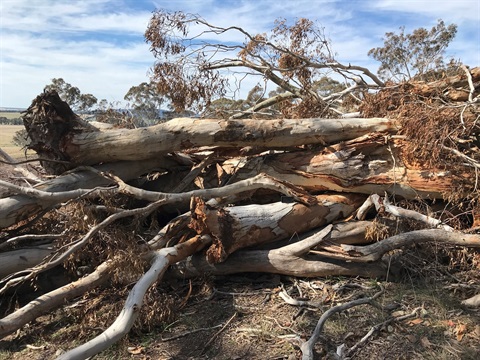
Goulburn Mulwaree Council is reminding residents of the rules and regulations around the clearing of trees and native vegetation, along with the negative impacts on native wildlife.
This comes after a significant increase in unauthorised clearing across Goulburn Mulwaree in recent months, with numerous trees illegally felled and cleared.
Goulburn Mulwaree Council’s Director Planning and Environment Scott Martin encouraged long-term, new, and prospective land holders to make themselves aware of their property’s zoning, along with any relevant legislation relating to clearing of any vegetation.
“Sadly, this clearing can have a devastating effect on critical habitat for threatened species, such as Gang Gang Cockatoos, Glossy Black Cockatoos, Greater Gliders, Yellow Bellied Gliders, Squirrel Gliders, and numerous other threatened fauna species including bats, owls and parrots,” Mr Martin said.
“There are also areas of koala habitat that have been destroyed due to unlawful clearing.
“The Mount Gray area of Goulburn in particular continues to be a concern, with Council staff responding to disappointing reports of rubbish being dumped, trees being cleared, and 4WDs illegally driving in the area, destroying protected habitats.
“Recently, Goulburn Mulwaree Council rangers, acting on reports of illegal tree clearing on Mount Gray, have issued warnings to people caught removing trees,” Mr Martin said.
Native vegetation is protected by a variety of legislative instruments, and penalties do apply if you clear without approval.
Council can issue Penalty Infringement Notices for unauthorised clearing under the Environmental Planning and Assessment Act 1979. In the case of a corporation the fine is $6,000, for an individual it is $3,000.
In addition, severe penalties may be imposed by NSW Department of Planning and Environment under the NSW Biodiversity Conservation Act 2016 for harm to threatened ecological communities, species or their habitats. In the case of a corporation, a penalty can be up to $5 million and $50,000 for each day the offence continues. In the case of an individual, the penalty can be up to $1 million and $10,000 for each day the offence continues.
Council works in collaboration with the NSW Department of Planning and Environment, and other agencies, including Local Land Services, Crown Lands and NSW Department of Primary Industries, to protect threatened ecological communities, species and their habitats.
Depending on where your property is located, and the clearing you would like to undertake, you will need to consult with Local Land Services or Council.
If you are clearing vegetation for agricultural purposes on rural zoned land, you will need to consult with Local Land Services. For all other clearing you will need to consult with Council.
Native vegetation is well defined within the Local Land Services Act 2013, including:
- Trees (including any sapling or shrub)
- Understorey plants
- Groundcover (being any type of herbaceous vegetation)
- Plants occurring in a wetland
“Many people do not know that native grasses are included under the definition of vegetation, and cannot be cleared without approval,” Mr Martin said.
As well as native plant species, all trees are protected on non-rural zoned land. A tree is defined in the Goulburn Mulwaree Development Control Plan 2009 as a perennial plant with at least one self-supporting woody or fibrous stem which is 3 metres or more in height and has a crown/branch span of 3 metres diameter or more.
There are some exemptions for tree species that are considered to be environmental weeds, such as Privets. A full list of exempt species is available in section 3.9.7 of the Goulburn Mulwaree Development Control Plan 2009.
“We encourage property owners to contact Council’s Planning and Development Liaison team prior to undertaking any clearing to have a definite idea of what is permissible and any relevant applications that may be required,” Mr Martin said.
“We have had cases recently of people claiming they were told by real estate agents, developers or other industry stakeholders that clearing was okay, but it’s important that you speak with us first.
“Although some exemptions may apply, typically approval is necessary.”





